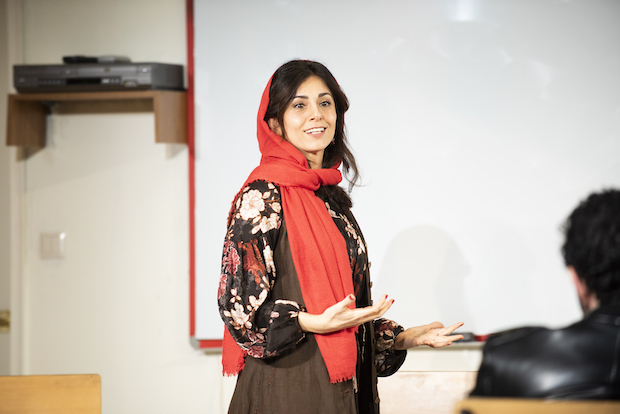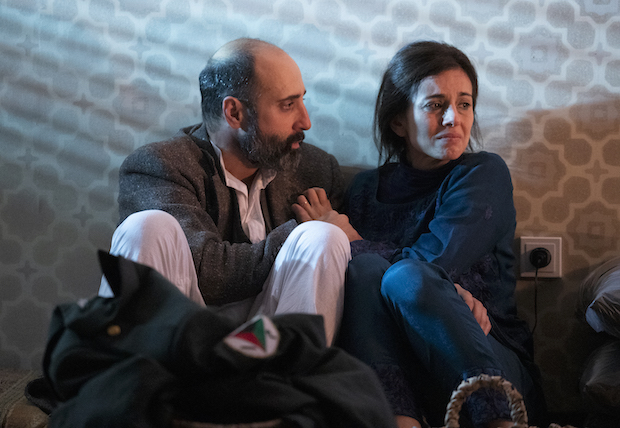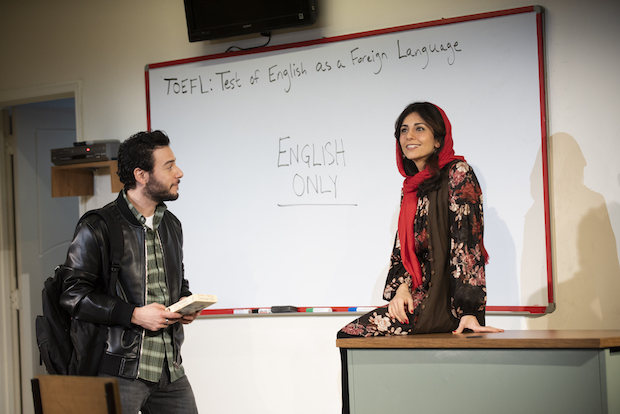Interview: Marjan Neshat's Very Big Year
The actor appeared in Sylvia Khoury’s ”Selling Kabul”, is currently starring in Sanaz Toossi’s ”English”, and is gearing up for Toossi’s ”Wish You Were Here”.

(© Ahron R. Foster)
Rumors of a sleepier theater season are overstated — especially for Marjan Neshat. In fact, this is proving to be her busiest year ever: In November-December she starred in Sylvia Khoury's Selling Kabul, playing Afiya, a woman trying her hardest to protect her brother from the Taliban. This spring she will play Nazanin, one of a circle of Iranian friends living through the 1979 revolution and the subsequent Iran-Iraq War, in Sanaz Toossi's Wish You Were Here. Both of those shows are part of the Playwrights Horizons 2021-22 season. But right now, she's performing at Atlantic Theater Company in Toossi's English, in which she portrays an Iranian English teacher who happens to also be named Marjan.
We spoke to Neshat about her very big year, her unique childhood, and the surprising through-line connecting all three of her characters.

(© Gigi Still)
This interview has been condensed and edited for clarity.
Is this your busiest theater season ever?
Without question. I won't have another day off until March 27, because I start rehearsals for Wish You Were Here on Monday [March 7].
You'll be rehearsing during the day and then going to performances of English at night. Have you ever done anything like that?
Not to this extent. We ended up closing Selling Kabul three days early because of Omicron. But if that had run as long as it was supposed to go, it would have been eight months straight. I've done a couple of plays in a year before, but never overlapping like this.
I imagine Covid creates another layer of complication when you're working with multiple companies. How many tests have you taken so far this season?
I'm the most tested woman in town. At Atlantic we've been testing four times a week. During Selling Kabul, we were testing two times, and then when Omicron came around we ramped up to three. So most days I wake up and test.

(© Joan Marcus)
In Selling Kabul, your character Afiya cares deeply about her brother, who has been targeted by the Taliban. But she expresses that love with a smothering amount of caution. Was your performance based on anyone you know?
I had a director tell me, "Afiya thinks faster than you." I began to understand that when you're in this critical situation, you're always forced to think ahead, because you are always trying to stave off disaster. I'm definitely a younger sister, so I probably drew some from my older sister. As an actor, I feel like you constantly borrow from everywhere.
Selling Kabul was meant to debut in March 2020, but Covid pushed that off until fall 2021. Did that change the way you experience the play?
Covid informed our show more than anything by making us all familiar with this feeling of being trapped. Everyone in our audience knew that feeling of being in a small apartment with people you love. You love them, and their lives matter to you, and they start to drive you crazy. That felt so much more palpable to us after Covid, and we were sharing it with an audience who had just experienced that.
In English, you're playing Marjan, a woman who learns English in Iran, lives abroad in England for a period, and then returns to Iran. This is somewhat similar to your own mother's story, right?
My mom's a psychiatric nurse and she attended nursing school in England, but then we returned to Iran. So she's like Marjan in that way, but I don't think she had the relationship to language in the way my character does. Marjan is one of the most complex characters I've ever played. There's such a conflict in her idea of herself and where she felt most alive. She's not at peace with where she is, but she's also not at peace with where she was.

(© Ahron R. Foster)
Do you remember when the English language came into your life in a significant way?
When I was 1, we moved to England and California, but we moved back to Iran and got stuck for a while. I finished third grade in Iran. So when we moved back to America, I was in fourth grade, and the only thing I knew confidently how to say was, "I don't know English." We were in this very small, suburban, predominately white part of Seattle. People were talking to me like I was deaf. I have a line in the play where I say, "Your head hurts and the days feel longer," and I felt that those first four months. It's this frustrating feeling of understanding what is going on, but not being able to respond. I'm now much more comfortable in English than I am in Farsi, but I will never forget that feeling.
Wish You were Here is about a group of Iranian Women living through the 1979 revolution and the subsequent war years. Is it meaningful to be telling this story about your parents' generation?
Sanaz always said she wrote this as a love letter to her mom and all of her friends. It's just the beginning of the revolution, and the story is about who left and who stayed. So many people upended their lives so their children could have a better life. They have this forced distance, and the play shows what this does with their lives.
Is that growing apart something every group of young women experiences?
Young women and men! I feel like our closest childhood friendships are really the first people we fall in love with. I feel this way about my childhood best friend. It's this time when you are free to feel as hugely as possible, so our identities are forged together. And if that relationship ends before its time, it becomes idealized.
There's an undercurrent of regret for all three characters you are playing this season.
The spine of each character has some element of lost potential. All of them are very aware of who they could have been, both by circumstance and choice. Afiya breaks my heart enormously, because that possibility is taken from her by other people's choices. It's a very human experience — contemplating the gap between what we imagine we will be and what we are. I cannot imagine how many therapists hear about this day in and day out.










